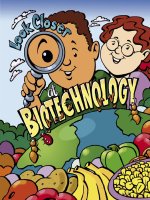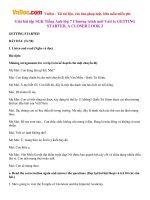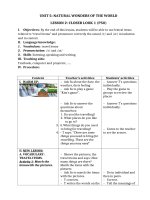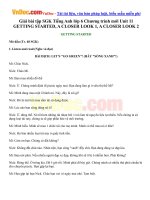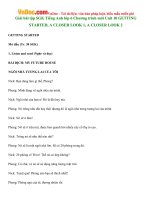Unit3A closer look2
Bạn đang xem bản rút gọn của tài liệu. Xem và tải ngay bản đầy đủ của tài liệu tại đây (716.91 KB, 16 trang )
1. Read the conversation in GETTING STARTED again.
Underline the reported speech. Then rewrite in direct speech
what Mai said to her brother Phuc and to her parents.
Mai: 'I'm too tired and don’t
_________________'
want to go out.
to be a designer.
Mai: 'I want _________________________'
Mai's parents: 'Design ________________
graduates won’t find
_________________________________
jobs easily. We want you to get a medical
_______'
degree.
Reported speech
1. statement
a/ simple present simple past
S+ Vinf / Ves/s S + Ved / V2
S + is /am /are +
S + was / were
b/ .simple past simple past / past perfect
S + Ved / V2 S + had + pp
/S + Ved / V2
c/ . present perfect past perfect
S + have / has + pp S + had + pp
d/ . present continuous past continuous
S + is / am / are + V-ing S + was / were + V-ing
e/ simple future
S + will +Vinf
S + would +Vinf
1. “I live in Danang “ She said
-She said she lived in Danang
2 . “We passed exam “ They said
They said they passed exam
They said they had passed exam
3.” I have already finished my test “ He said
He said that he had already finished his test
4. “ I will have a party tomorrow” She said
She said she would have a party the next day
3 Yes- No question
a/ Do/ Does + S + V inf …? ….if/ whether + S + Ved / V2
b/ Did + S + V inf …? …….if/ whether + S + Ved / V2
…….if/ whether + S + had + PP
“Do you like him ?’ She asked me
She asked me if / whether .I liked him .......................
c/ Have / has + S + PP ? …..if/ whether + S + had + PP
“have you ever see an elephant ?” She asked me
She asked me if I had ever seen an elephant
d/ Is / Am /Are + S +V ing ?..if/ whether+S+was/ were+Ving
Is / Am / Are + S + ? …..if/ whether + S + was/ were
e/ will +S+ Vinf
…..if/ whether +S + would +Vinf
“ will you go for a picnic next week ?” She asked me
She asked me if would go for a picnic the following week
4. Wh – question
a / Wh +Do/ Does + S + V inf …? ….Wh + S + Ved / V2
“What does she eat “? He asked me
He asked me what she ate
b/ Wh +Did + S + V inf …? ………Wh .+ S + Ved / V2
……….Wh + S + had + PP
“Who did you live with last year”? I asked her
I asked her who she lived the year before
c./ Wh+ Have / has + S + PP ? …..Wh + S + had + PP
d/Wh+ Is /Am / Are+S+V ing ? ….Wh +S + was/ were+Ving
Wh+ Is / Am / Are + S + ? …..Wh + S + was/ were +
e/ Wh + will +S+ Vinf
.... wh +S + would +Vinf
“Where are they living now ?” She asked me
She asked me where they were living then
6. Adverbs
• - Today that day
• -Yesterday the day before
• - the day before yesterday two day before
• -tomorrow
the next day/ the following day
• -next week/ year…the following week/ year
• -last week/year…the week/year before
• -ago
before/ earlier
• - now then
• -Here there
• -this that
• -these those
5.Question words before toinfinitives
-We can use question words who, what, where,
when, how before a to-infinitive to express a
situation that it is difficult or uncertain.
We don't know who we should contact. → We don't
know who to contact.
-We often use the verbs ask, wonder, (not) be sure,
have no idea, (not) know, (not) decide, (not) tell
before the question word +to-infinitive.
I have no idea where to get this information.
( question word why cannot be used)
Tip : You may use the following verbs: ask, wonder,
(not) be sure, have no idea, (not) know,(not)decide,
(not) tell
2. Rewrite the following sentences in reported speech.
1. 'We will visit you this week,' my parents told me.
- __________________________________________________
My parents told me they would visit me that week.
2. Our teacher asked us, 'What are you most worried about?'
- __________________________________________________
Our teacher asked us what we were most worried about .
3. 'I'm so delighted. I've just received a surprise birthday present
from my sister,' Phuong told me.
- __________________________________________________
Phuong told me she was so delighted because she had just
__________________________________________________
received a surprised birthday present from her sister.
4. 'Kate can keep calm even when she has lots of pressure,' Tom
said.
- Tom
__________________________________________________
said Kate could keep calm even when she had lots of pressure.
5. 'I got a very high score in my last test, Mum,’ she said.
- She
__________________________________________________
told her mother she had got a very high score in her last test.
6. 'Do you sleep at least eight hours a day?' the doctor asked him.
- __________________________________________________
The doctor asked him if he slept at least eight hours a day.
Question words before to-infinitives
We can use question words who, what, where, when, how
before a to-infinitive to express a situation that it is difficult
or uncertain.
Example:
We don't know who we should contact.
→ We don't know who to contact.
Look out!
The question word why cannot be used before a
to-infinitive.
We often use the verbs ask, wonder, (not) be sure, have no
idea, (not) know, (not) decide, (not) tell before the question
word +to-infinitive.
Example:
I have no idea where to get this information.
3. Rewrite the sentences using question words +to-infinitives.
1. I don't know what I should wear!
- ____________________________________________
I don’t know what to wear.
2. Could you tell me where I should sign my name?
- ____________________________________________
Could you tell me where to sign my name?
3. I have no idea when we should leave for the bus.
- ____________________________________________
I have no idea when to leave for the bus.
4. We're not sure where we should hang the painting.
- ____________________________________________
We are not sure where to hang the painting.
5. He wondered how he could tell this news to his parents.
- ____________________________________________
He wondered how to tell this news to his parents.
6. They can't decide who should go first.
- ____________________________________________
They can’t decide who to go first.
Reported questions with question words before to-infinitives
Question words before to-infinitives can be used to report
questions about something that should be done.
Example: 'What should I do?' she said.
→ She wondered what to do.
Look out!
To report Yes/No questions we use whether
before to-infinitive. Remember if cannot be used
in this case.
Example:
“Should I tell my parents what I really think?” she
wondered.
→ She wondered whether to tell her parents
what she really thought.
4. Rewrite the following questions in reported speech, using
question words before to-infinitives.
Tip: You may use the following verbs: ask, wonder, (not)
be sure, have no idea, (not) know, (not) decide,
(not) tell.
1. 'How should we use this support service?' they wondered.
They wondered how to use that support service.
2. 'Who should I turn to for help?' he asked.
He had no idea who to turn to for help.
3. 'Mum, when should I turn off the oven?' Mai asked her mother.
Mai asked her mother when to turn off the oven.
4. 'Where should we park our bikes?' asked Phong and Minh.
Phong and Minh couldn’t decide where to park their bikes.
5. 'Should we call her now?' he asked.
He was not sure whether to call her than.
6. 'What should we do to make Linh feel happier?‘ they wondered.
They wondered what to do to make Linh feel happier.
-
5. GAME
SOMETHING ABOUT OUR TEACHER ...
Decide as a whole class five questions you want to ask
about the teacher. Then the class divides into two groups:
one group stays inside the class and the other goes outside.
The teacher will tell each group the answers to the
questions. The class gets together again and in pairs you
must report on what the teacher has told you.
Do you have a pet?
If so, what is it?
What’s its name?

